Fires at two transmission substations in Wisconsin's capital on Friday knocked out power to thousands of customers on the hottest day of the year to-date, sending dual plumes of thick, black smoke into the air and shutting down government buildings, courtrooms and businesses, and leading the governor to declare a state of emergency.
No injuries were reported as a result of the 7:40 a.m. explosion and fire at the Madison Gas and Electric main power center a few blocks from the state Capitol, which was among the buildings that were forced to close. A second fire at a substation near the University of Wisconsin-Madison, a couple of miles to the west, prompted the evacuation of nearby buildings. No injuries were reported as a result of that blast, either.
At its peak, more than 13,000 people were without power. While there were fluctuating numbers as power was being restored, nearly everyone had power back on by Friday evening.
Gov. Tony Evers declared a state of emergency in Madison and surrounding Dane County. The declaration authorizes the activation of the National Guard if necessary and directs state agencies to provide assistance. The Guard had not been activated as of late Friday afternoon.
"Keeping folks safe remains our top priority as we continue to manage and respond to this situation," Evers said in a statement.
The Capitol closed, but it did not affect the Legislature because it is on a break for the summer. The city-county building across the street from the Capitol also closed and the Wisconsin Department of Health Services, which is around the corner, sent employees home and directed the public to leave the building because of the lack of electricity.
All state court system offices in downtown Madison, including the state Supreme Court and Court of Appeals, also closed because of the outage. Public access to some court system electronic services, including the Wisconsin Circuit Court Access website and electronic filing in some counties, was also down. Traffic lights were knocked out throughout the downtown area because of the outage.
Residents with no access to air conditioning were advised to be on alert as the National Weather Service issued an excessive heat warning for the area Friday, with temperatures in the 90s and high humidity. Shelter was available at the Kohl Center, where the UW basketball team plays, on campus.
Public Health Madison and Dane County officials advised all businesses, including restaurants, that don't have emergency backup power sources, to close until power was restored.
Zane Geyer, a construction worker working on the seventh floor of the downtown Gebhardt Building told the Wisconsin State Journal he saw the first explosion.
"Flames went about 150 feet (46 meters) into the air," Geyer said. "The fire kept getting bigger, and the transformers' oil inside probably fueled it."
Geyer said there were three or four explosions after the first one, as transformers blew.
Utility officials said they had not identified the cause of the explosion, but they had ruled out heat and were looking at mechanical issues.
In a late afternoon statement, the city said the Madison Fire Department had to use a foam that's often associated with contaminants known as perfluoroalkyl substances, or PFAS. The city said it's not clear whether the foam actually contained PFAS, but it is being tested and steps were taken to lessen the spread of water and foam.
Two environmental engineering companies have removed hundreds of gallons of water from the storm sewer in two areas, and the water will be tested. Barriers were installed to curtail water run-off and soil will be removed as part of the remediation process, the city said.
VENICE, Italy (AP) — Under the gaze of the world’s media, the fragile lagoon city of Venice launched a pilot program Thursday to charge day-trippers a 5-euro ($5.35) entry fee that authorities hope will discourage visitors from arriving on peak days and make the city more livable for its dwindling residents.
Visitors arriving at Venice's main train station were greeted with large signs listing the 29 dates through July of the plan's test phase that also designated separate entrances for tourists, and residents, students and workers.
“We need to find a new balance between the tourists and residents,’’ said Simone Venturini, the city’s top tourism official. “We need to safeguard the spaces of the residents, of course, and we need to discourage the arrival of day-trippers on some particular days.”
Not all residents, however, are persuaded of the efficacy of the new system in dissuading mass tourism, insisting that only a resurgence in the population will restore balance to a city where narrow alleyways and water buses are often clogged with tourists.
Hundreds of Venetians protested against the program, marching festively though the city's main bus terminal behind banners reading “No to Tickets, Yes to Services and Housing.” Protesters scuffled briefly with police with riot gear who blocked them from entering the city, before changing course and entering over another bridge escorted by plainclothes police officers. The demonstration wrapped up peacefully in a piazza.
Tourists arriving at the main station encountered almost as many journalists as stewards on hand to politely guide anyone unaware of the new requirements through the process of downloading the QR code to pay the fee.
Arianna Cecilia, a tourist from Rome visiting Venice for the first time, said she thought it was “strange” to have to pay to enter a city in her native country, and be funneled through separate entrance ways for tourists. She and her boyfriend were staying in nearby Treviso, and so downloaded the QR code as required. But she was still caught off-guard while soaking in her first view ever of Venice's canals by the sight of the entrance signs and her boyfriend telling her to get out the ticket.
On the other side of the entrance ways, workers in yellow vests carried out random checks at the train station. Transgressors face fines of 50 to 300 euros ($53 to $320), but officials said “common sense” was being applied for the launch.
The requirement applies only for people arriving between 8:30 a.m. and 4 p.m. Outside of those hours, access is free and unchecked.
Venice has long suffered under the pressure of overtourism, and officials hope that the pilot project can help provide more exact figures to better manage the phenomenon.
The city can track the number of hotel visitors, which last year numbered 4.6 million and is down 16% from pre-pandemic highs. But the number of day visitors, which make up the majority of the crowds in Venice, could only be estimated until recently.
A Smart Control Room set up during the pandemic has been tracking arrivals from cellphone data, roughly confirming pre-pandemic estimates of 25 million to 30 million arrivals a year, said Michele Zuin, the city’s top economic official. That includes both day-trippers and overnight guests.
But Zuin said the data is incomplete.
“It’s clear we will get more reliable data from the contribution” being paid by day-trippers, he said.
Venturini said the city is strained when the number of day-trippers reaches 30,000 to 40,000. On peak days, local police set up one-way traffic for pedestrians to keep the crowds moving.
Residents opposing the day-tripper tax insist that the solution to Venice's woes are to boost the resident population and the services they need, limiting short-term rentals to make available more housing and attract families back from the mainland.
Last year, Venice passed a telling milestone when the number of tourist beds exceeded for the first time the number of official residents, which is now below 50,000 in the historic center with its picturesque canals.
“Putting a ticket to enter a city will not decrease not even by one single unit the number of visitors that are coming,’’ said Tommaso Cacciari, an activist who organized a protest Thursday against the measure.
“You pay a ticket to take the metro, to go to a museum, an amusement park. You don’t pay a ticket to enter a city. This is the last symbolic step of a project of an idea of this municipal administration to kick residents out of Venice,” he said.
Venice Mayor Luigi Brugnaro declared the launch day, coinciding with an Italian holiday, a success, registering 15,700 paying visitors, 50% more than anticipated.
More than 97,000 others had downloaded a QR code denoting an exemption, including to work in Venice or as a resident of the Veneto region. Hotels in Venice, including in mainland districts like Marghera or Mestre, provided a QR code for visitors to attest to their stay, which includes a hotel tax — accounting for 40,000 of those.
Venturini, the tourist official, said that interest in Venice’s pilot program has been keen from other places suffering from mass tourism, including other Italian art cities, and municipalities abroad such as Barcelona, Spain, and Amsterdam.
But Marina Rodino, who has lived in Venice for 30 years, doesn't see the fee as the cure-all. Neighboring apartments in her residential building near the famed Rialto Bridge once inhabited by families are now short-term apartment rentals.
The corner butcher shop closed. Yet she noted that the new entrance fee requirement will still allow young people to flood the city in the evening for the traditional aperitivo, which can grow rowdy.
She was passing out mock European Union passports for “Venice, Open City,” underlining the irony of the new system, and challenging its legal standing with citations from the Italian Constitution guaranteeing its citizens the right to “move or reside freely in any part of the national territory."
“This is not a natural oasis. This is not a museum. It is not Pompeii. It is a city, where we need to fight so the houses are inhabited by families, and stores reopen. That is what would counter this wild tourism,’’ Rodino said.
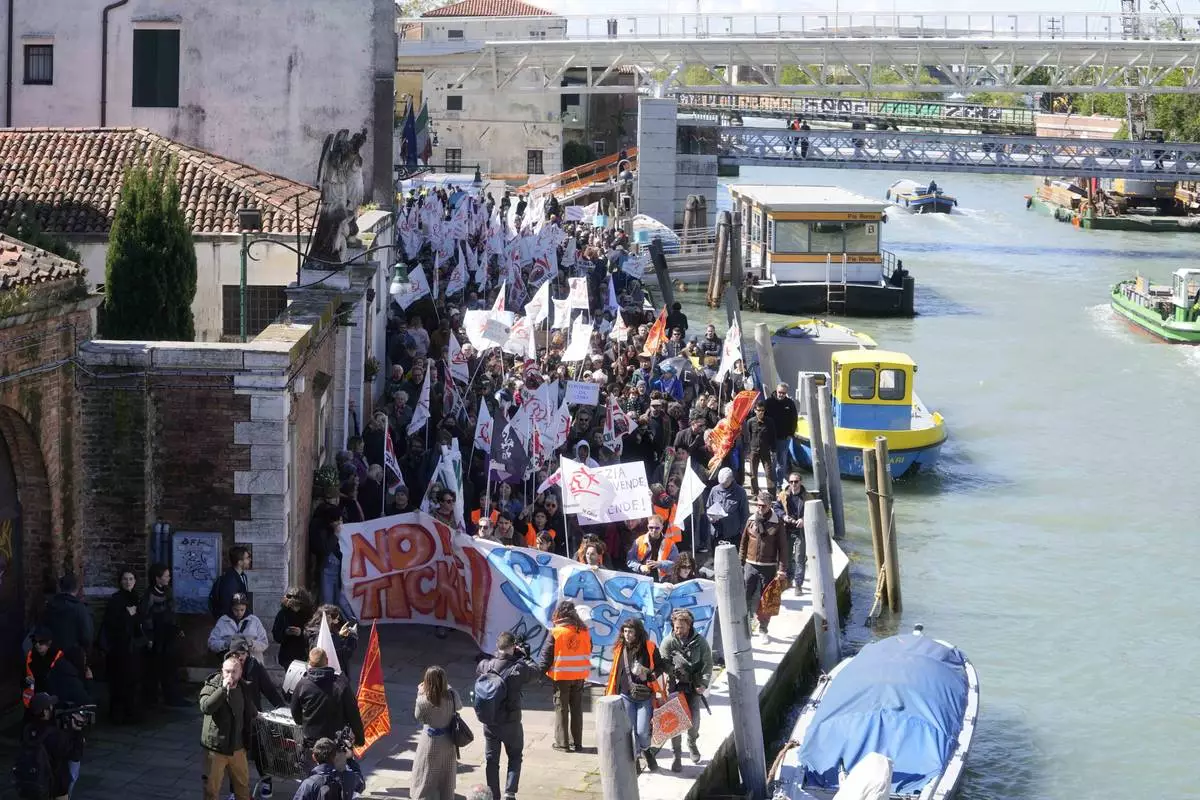
Citizens and activists stage a protest against Venice Tax Fee in Venice, Italy, Thursday, April 25, 2024. The fragile lagoon city of Venice begins a pilot program Thursday to charge daytrippers a 5 euro entry fee that authorities hope will discourage tourists from arriving on peak days. The daytripper tax is being tested on 29 days through July, mostly weekends and holidays starting with Italy's Liberation Day holiday Thursday. Officials expect some 10,000 people will pay the fee to access the city on the first day, downloading a QR code to prove their payment, while another 70,000 will receive exceptions, for example, because they work in Venice or live in the Veneto region. (AP Photo/Luca Bruno)

A citizen shows a ticket with the writing 'Veniceland' during a protest against Venice Tax Fee in Venice, Italy, Thursday, April 25, 2024. The fragile lagoon city of Venice begins a pilot program Thursday to charge daytrippers a 5 euro entry fee that authorities hope will discourage tourists from arriving on peak days. The daytripper tax is being tested on 29 days through July, mostly weekends and holidays starting with Italy's Liberation Day holiday Thursday. Officials expect some 10,000 people will pay the fee to access the city on the first day, downloading a QR code to prove their payment, while another 70,000 will receive exceptions, for example, because they work in Venice or live in the Veneto region. (AP Photo/Luca Bruno)
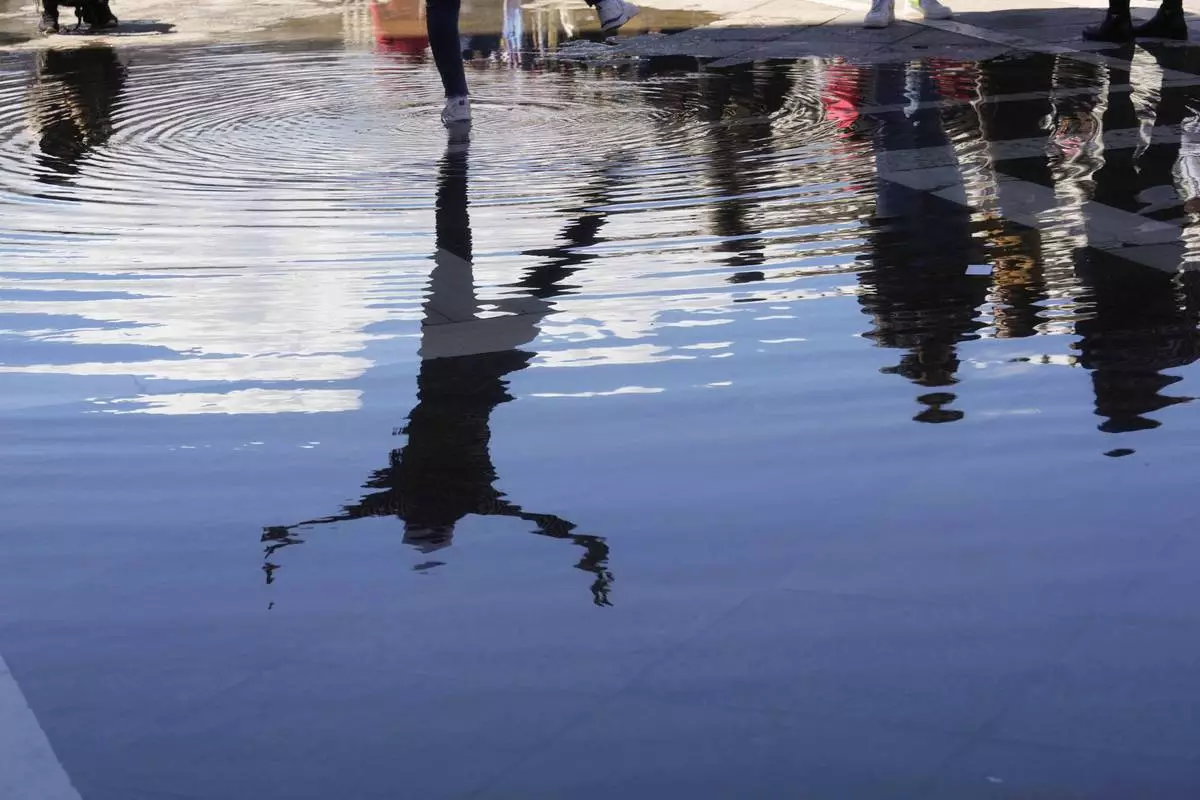
Tourists enjoy a sunny day at St.Mark square in Venice, Italy, Thursday, April 25, 2024. The fragile lagoon city of Venice begins a pilot program Thursday to charge daytrippers a 5 euro entry fee that authorities hope will discourage tourists from arriving on peak days. (AP Photo/Luca Bruno)
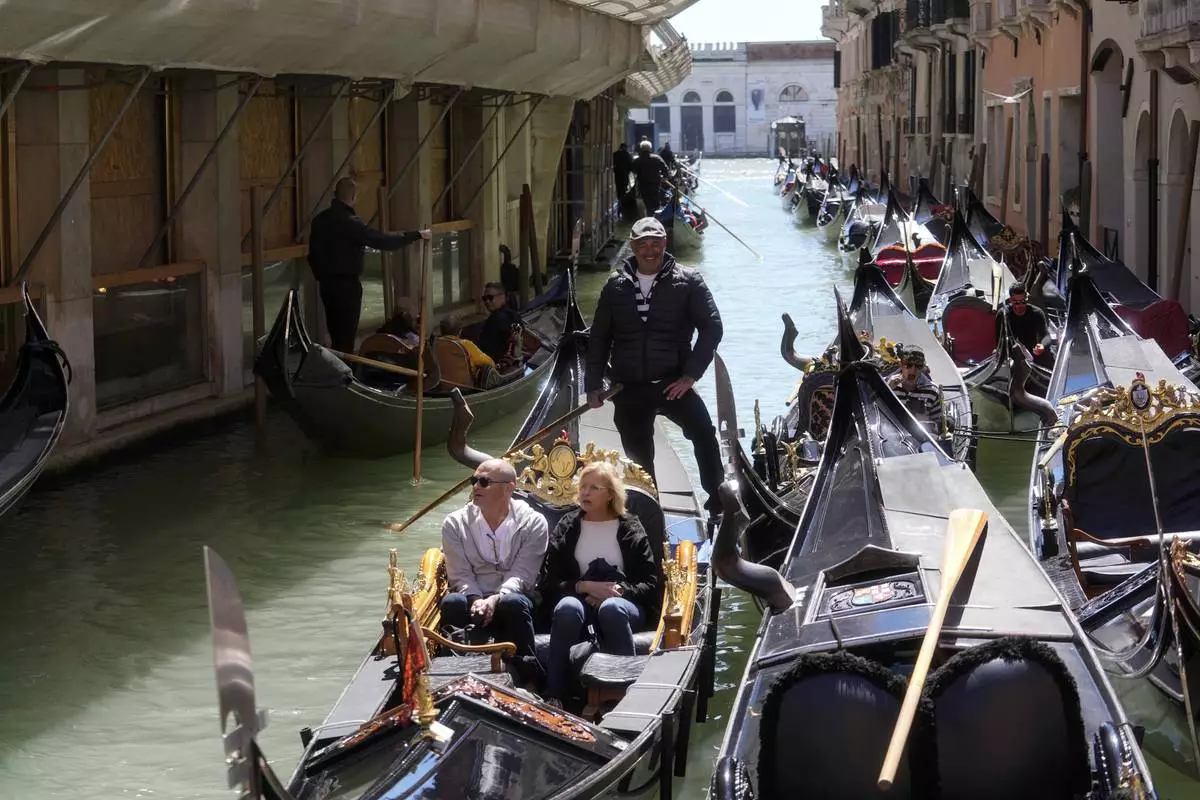
Tourists enjoy a ride on gondolas in Venice, Italy, Thursday, April 25, 2024. The fragile lagoon city of Venice begins a pilot program Thursday to charge daytrippers a 5 euro entry fee that authorities hope will discourage tourists from arriving on peak days. (AP Photo/Luca Bruno)
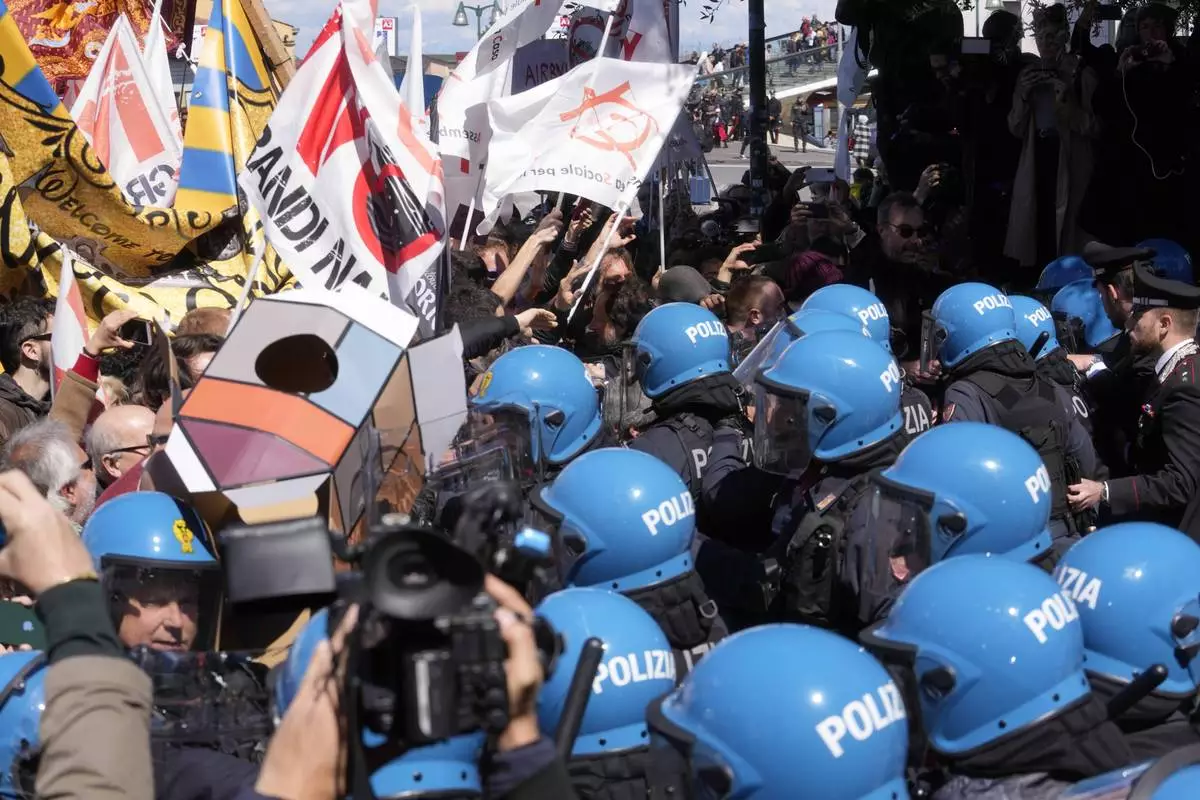
Citizens and activists confront police during a demonstration against Venice Tax Fee in Venice, Italy, Thursday, April 25, 2024. The fragile lagoon city of Venice begins a pilot program Thursday to charge daytrippers a 5 euro entry fee that authorities hope will discourage tourists from arriving on peak days. The daytripper tax is being tested on 29 days through July, mostly weekends and holidays starting with Italy's Liberation Day holiday Thursday. Officials expect some 10,000 people will pay the fee to access the city on the first day, downloading a QR code to prove their payment, while another 70,000 will receive exceptions, for example, because they work in Venice or live in the Veneto region. (AP Photo/Luca Bruno)
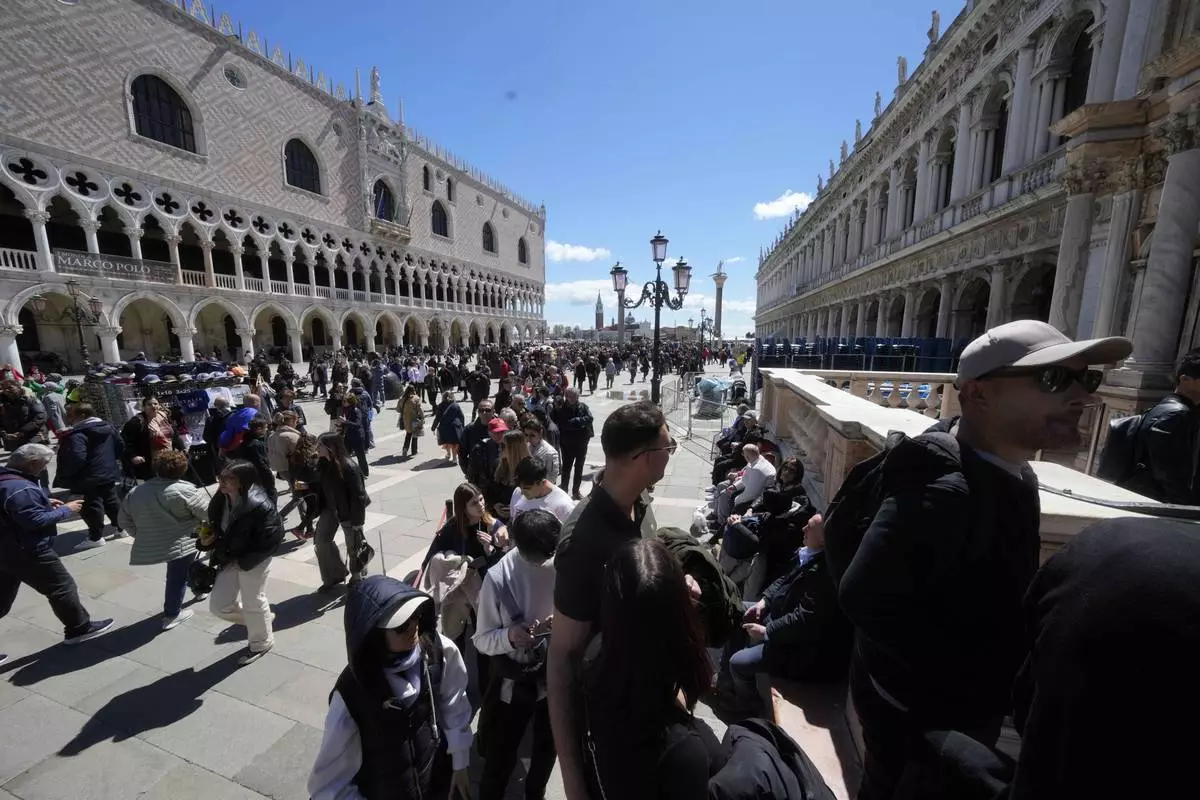
Tourists line up to enter at the at St.Mark bell tower in Venice, Italy, Thursday, April 25, 2024. The fragile lagoon city of Venice begins a pilot program Thursday to charge daytrippers a 5 euro entry fee that authorities hope will discourage tourists from arriving on peak days. (AP Photo/Luca Bruno)
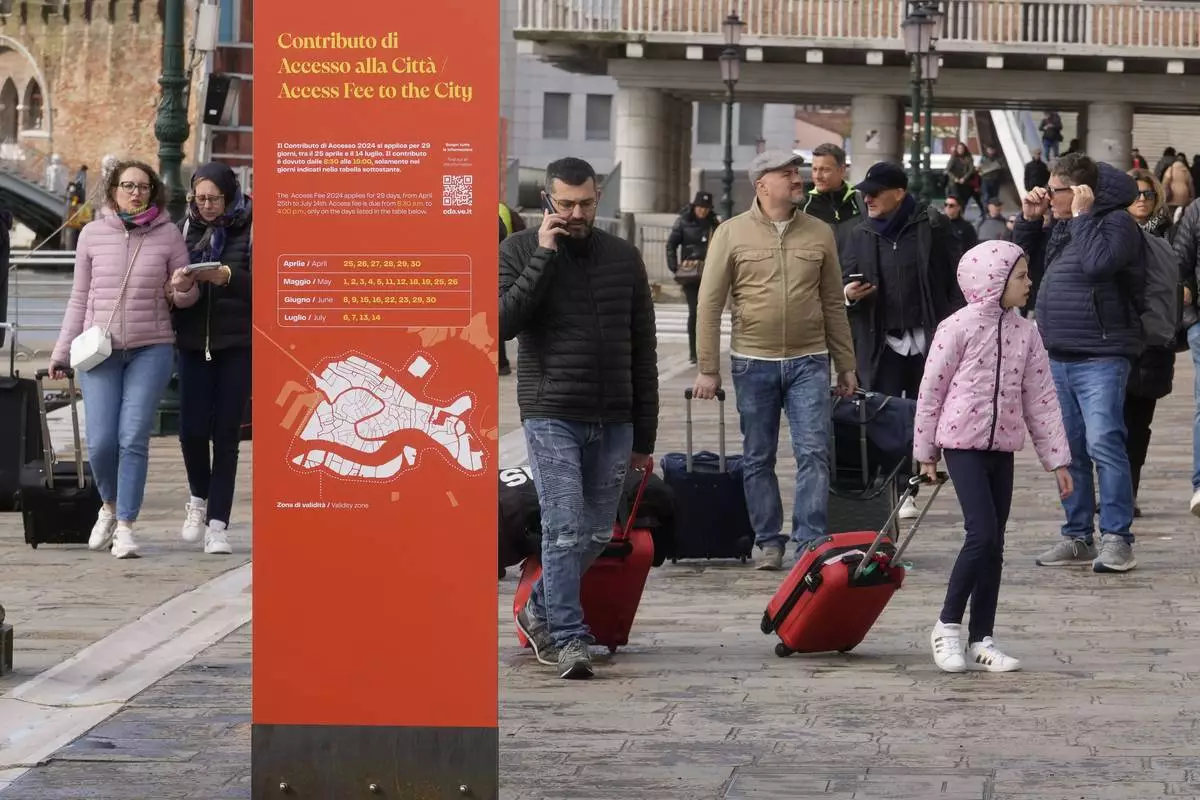
Tourists arrive in Venice, Italy, Thursday, April 25, 2024. The fragile lagoon city of Venice begins a pilot program Thursday to charge daytrippers a 5 euro entry fee that authorities hope will discourage tourists from arriving on peak days. The daytripper tax is being tested on 29 days through July, mostly weekends and holidays starting with Italy's Liberation Day holiday Thursday. Officials expect some 10,000 people will pay the fee to access the city on the first day, downloading a QR code to prove their payment, while another 70,000 will receive exceptions, for example, because they work in Venice or live in the Veneto region. (AP Photo/Luca Bruno)
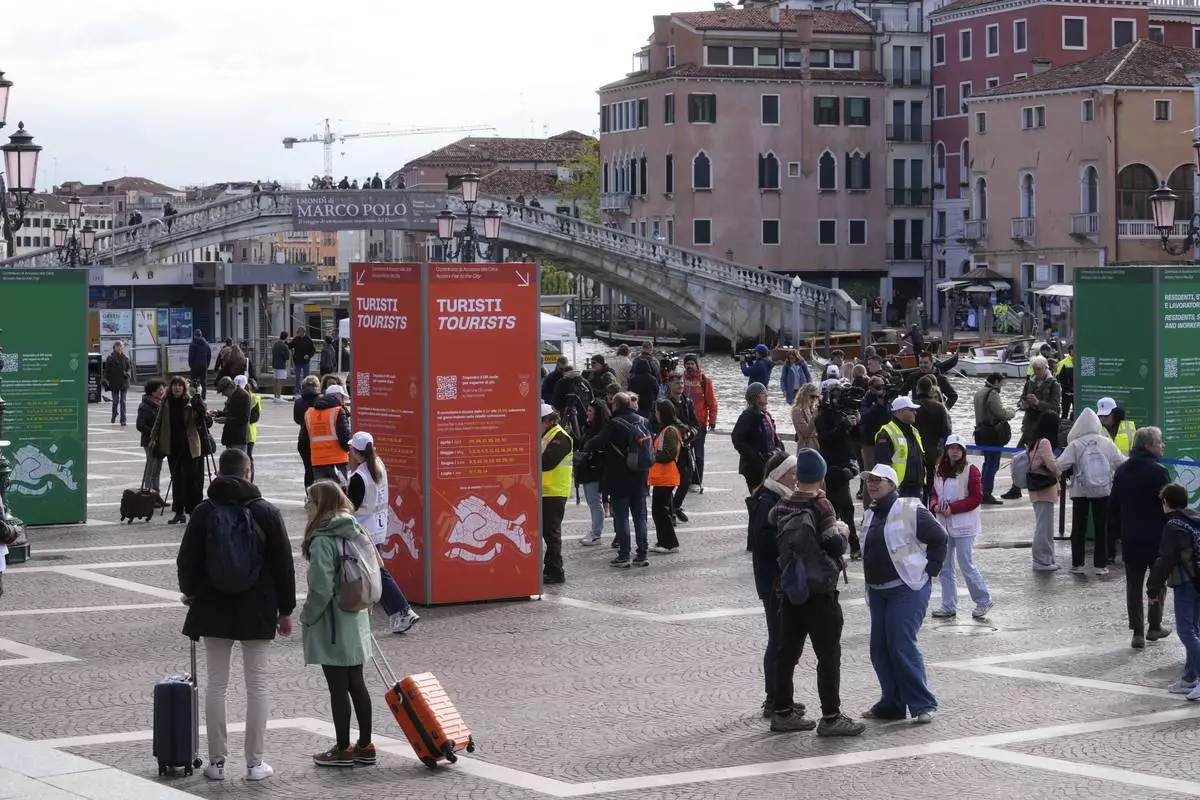
Stewards check tourists QR code access outside the main train station in Venice, Italy, Thursday, April 25, 2024. The fragile lagoon city of Venice begins a pilot program Thursday to charge daytrippers a 5 euro entry fee that authorities hope will discourage tourists from arriving on peak days. The daytripper tax is being tested on 29 days through July, mostly weekends and holidays starting with Italy's Liberation Day holiday Thursday. Officials expect some 10,000 people will pay the fee to access the city on the first day, downloading a QR code to prove their payment, while another 70,000 will receive exceptions, for example, because they work in Venice or live in the Veneto region. (AP Photo/Luca Bruno)
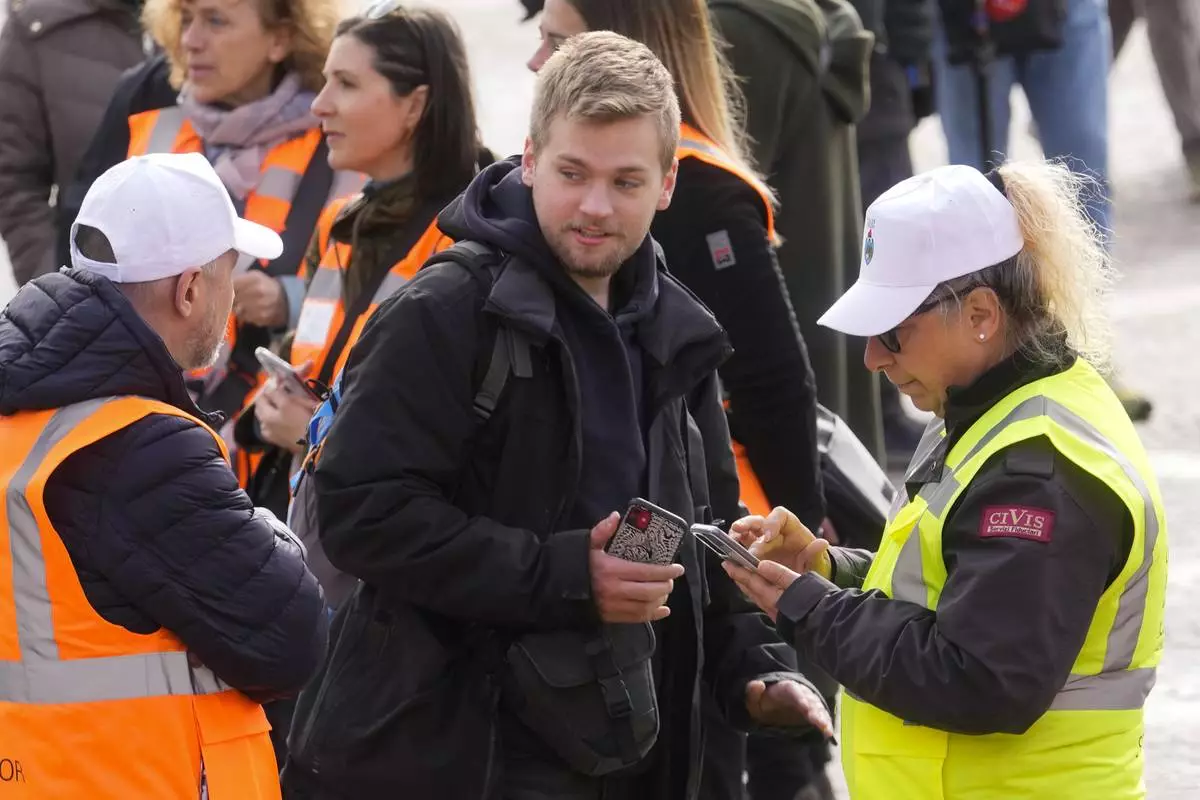
Stewards check a tourist QR code access outside the main train station in Venice, Italy, Thursday, April 25, 2024. The fragile lagoon city of Venice begins a pilot program Thursday to charge daytrippers a 5 euro entry fee that authorities hope will discourage tourists from arriving on peak days. The daytripper tax is being tested on 29 days through July, mostly weekends and holidays starting with Italy's Liberation Day holiday Thursday. Officials expect some 10,000 people will pay the fee to access the city on the first day, downloading a QR code to prove their payment, while another 70,000 will receive exceptions, for example, because they work in Venice or live in the Veneto region. (AP Photo/Luca Bruno)
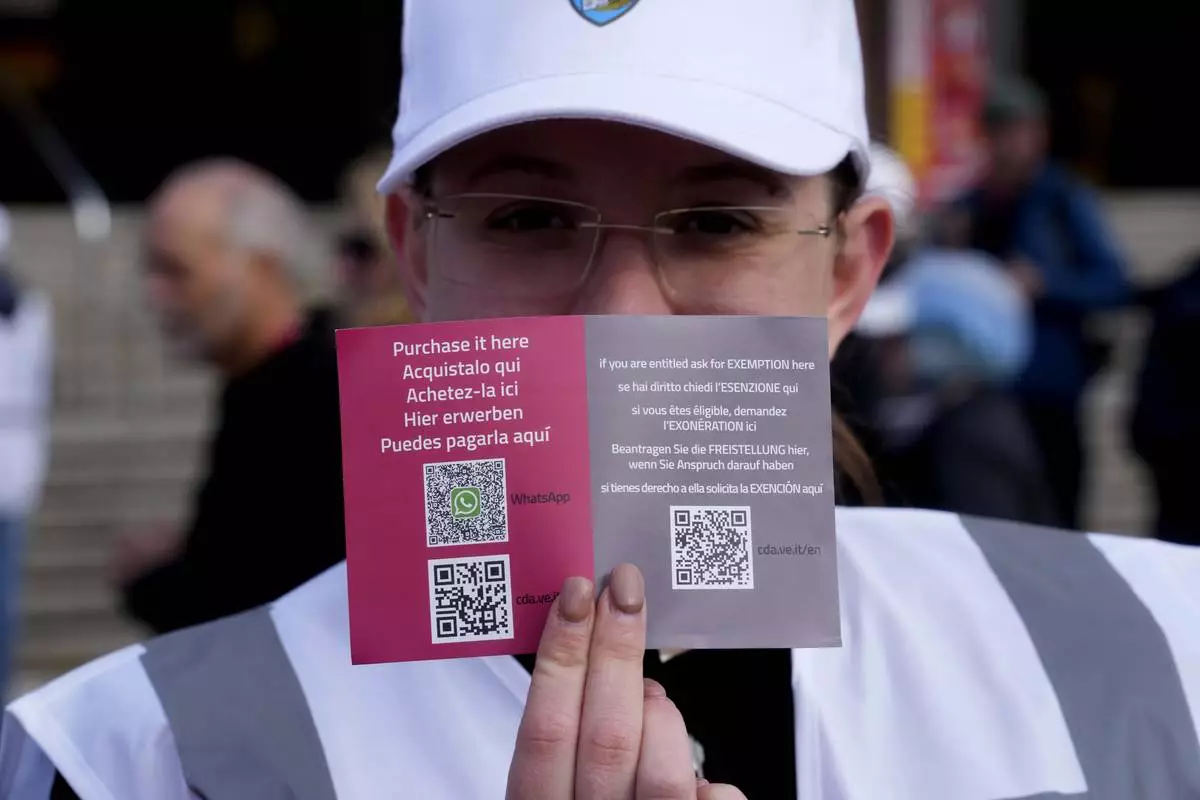
A steward shows the QR code access outside the main train station in Venice, Italy, Thursday, April 25, 2024. The fragile lagoon city of Venice begins a pilot program Thursday to charge daytrippers a 5 euro entry fee that authorities hope will discourage tourists from arriving on peak days. The daytripper tax is being tested on 29 days through July, mostly weekends and holidays starting with Italy's Liberation Day holiday Thursday. Officials expect some 10,000 people will pay the fee to access the city on the first day, downloading a QR code to prove their payment, while another 70,000 will receive exceptions, for example, because they work in Venice or live in the Veneto region. (AP Photo/Luca Bruno)
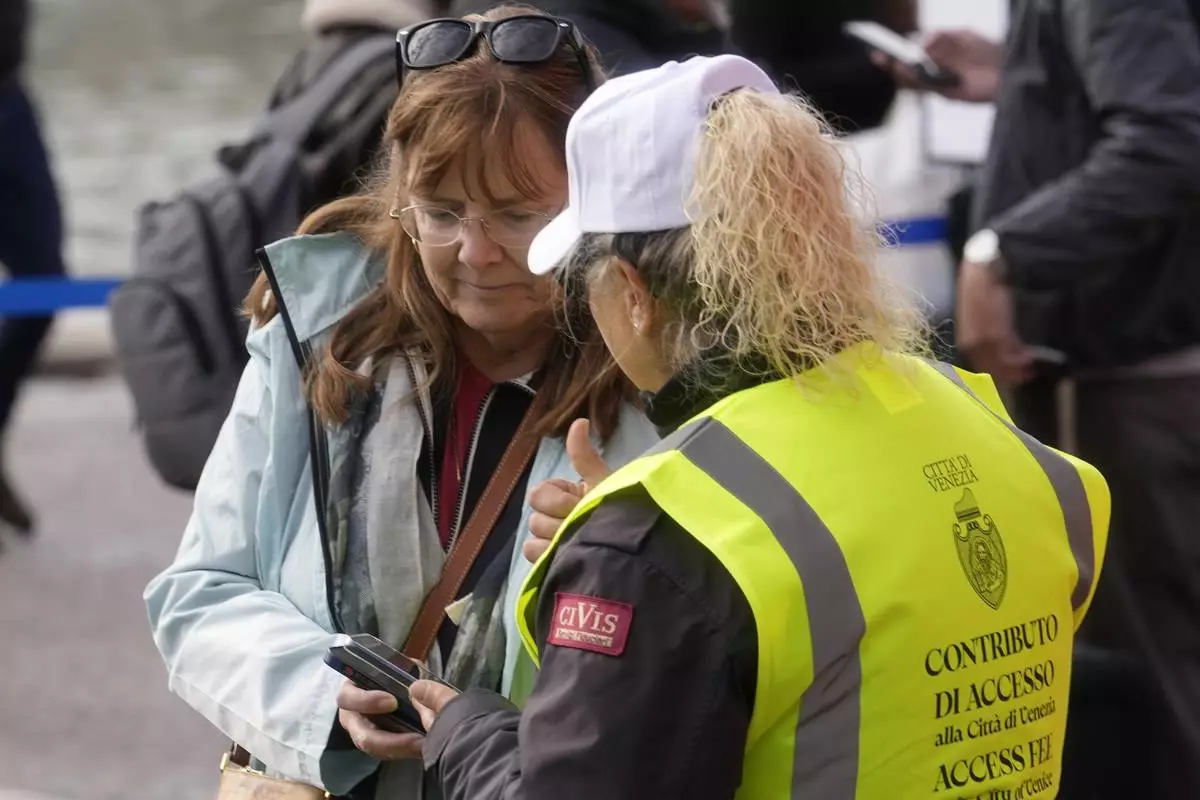
A steward checks a tourist QR code access outside the main train station in Venice, Italy, Thursday, April 25, 2024. The fragile lagoon city of Venice begins a pilot program Thursday to charge daytrippers a 5 euro entry fee that authorities hope will discourage tourists from arriving on peak days. The daytripper tax is being tested on 29 days through July, mostly weekends and holidays starting with Italy's Liberation Day holiday Thursday. Officials expect some 10,000 people will pay the fee to access the city on the first day, downloading a QR code to prove their payment, while another 70,000 will receive exceptions, for example, because they work in Venice or live in the Veneto region. (AP Photo/Luca Bruno)
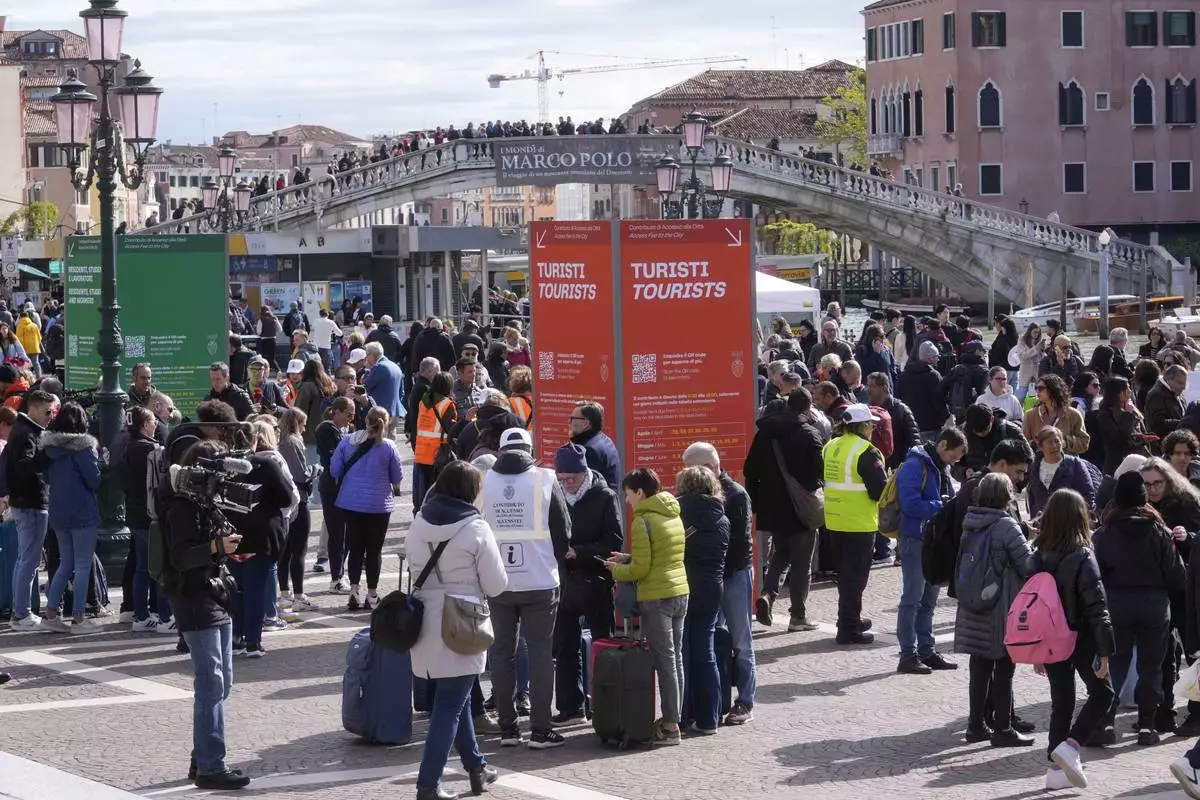
Stewards check tourists QR code access outside the main train station in Venice, Italy, Thursday, April 25, 2024. The fragile lagoon city of Venice begins a pilot program Thursday to charge daytrippers a 5 euro entry fee that authorities hope will discourage tourists from arriving on peak days. The daytripper tax is being tested on 29 days through July, mostly weekends and holidays starting with Italy's Liberation Day holiday Thursday. Officials expect some 10,000 people will pay the fee to access the city on the first day, downloading a QR code to prove their payment, while another 70,000 will receive exceptions, for example, because they work in Venice or live in the Veneto region. (AP Photo/Luca Bruno)
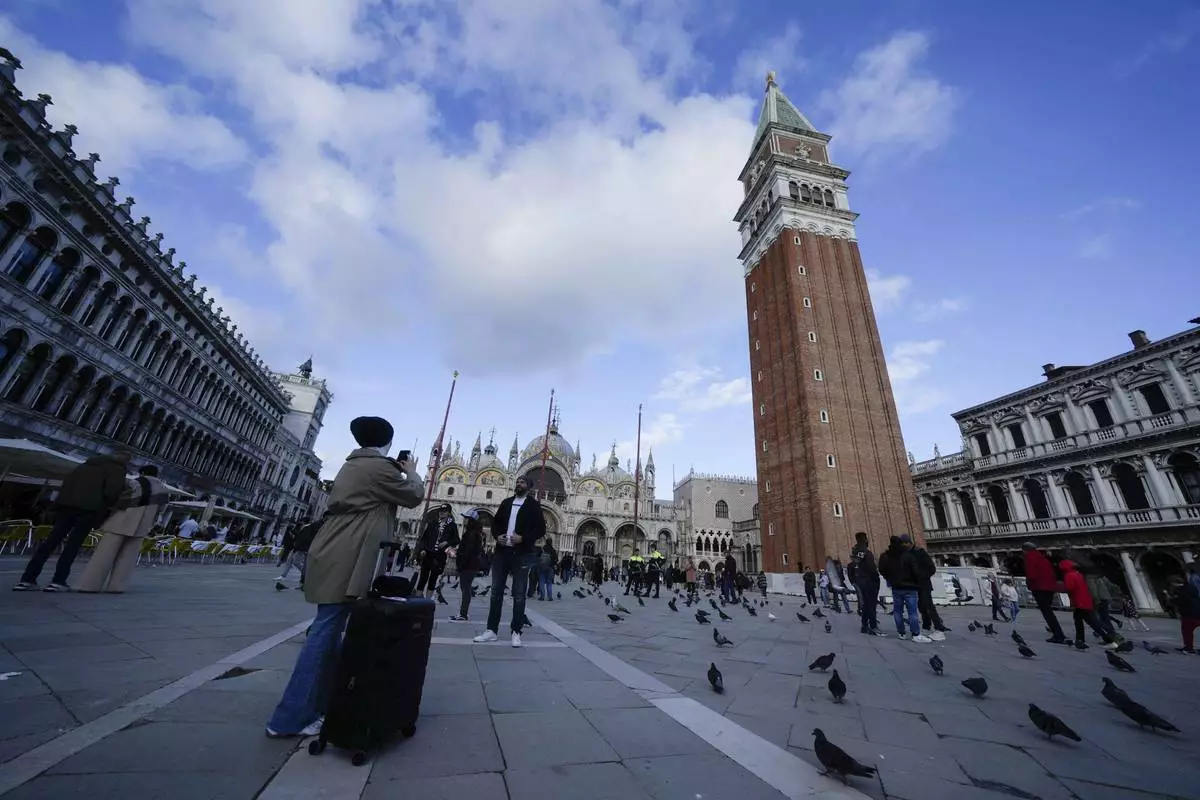
Tourists take pictures at the St. Mark square in Venice, Italy, Wednesday, April 24, 2024. The lagoon city of Venice begins a pilot program Thursday, April 25, 2024 to charge daytrippers a 5 euro entry fee that authorities hope will discourage tourists from arriving on peak days. Officials expect some 10,000 people will pay the fee to access the city on the first day, downloading a QR code to prove their payment. (AP Photo/Luca Bruno)
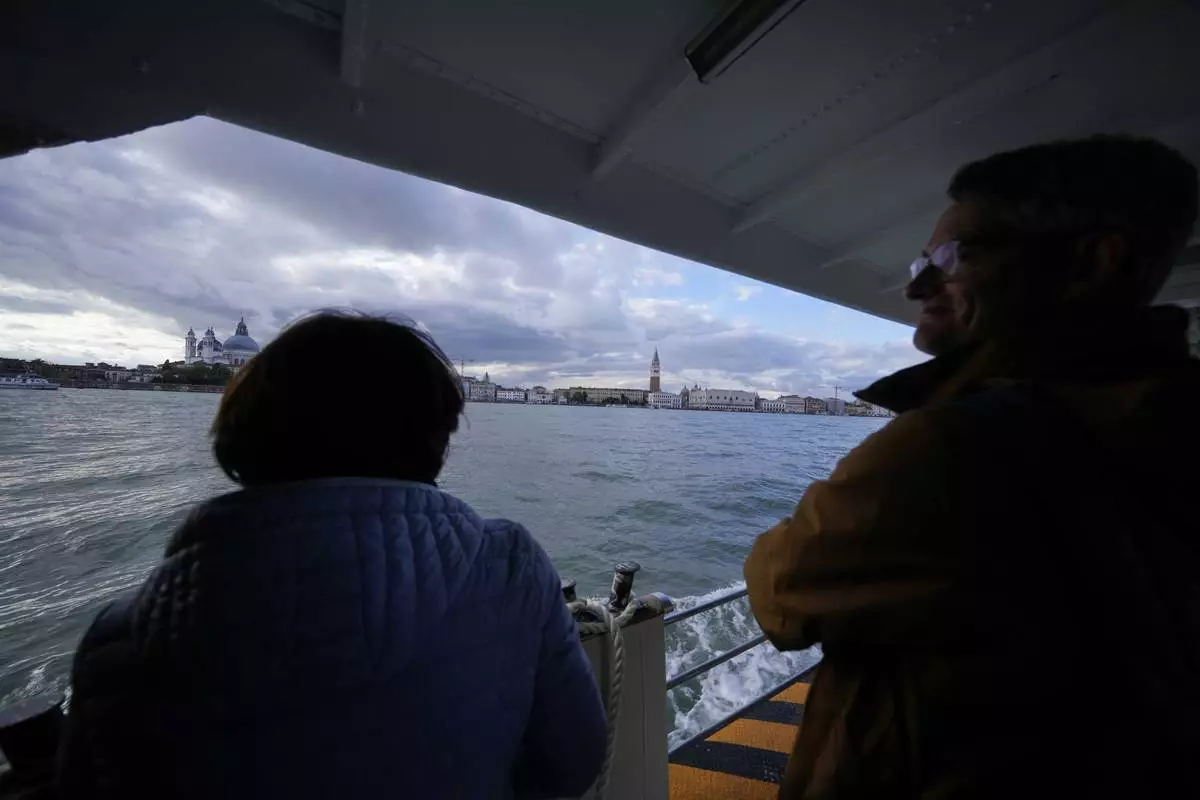
Tourists ride on a ferry boat in Venice, Italy, Wednesday, April 24, 2024. The lagoon city of Venice begins a pilot program Thursday, April 25, 2024 to charge daytrippers a 5 euro entry fee that authorities hope will discourage tourists from arriving on peak days. Officials expect some 10,000 people will pay the fee to access the city on the first day, downloading a QR code to prove their payment. (AP Photo/Luca Bruno)
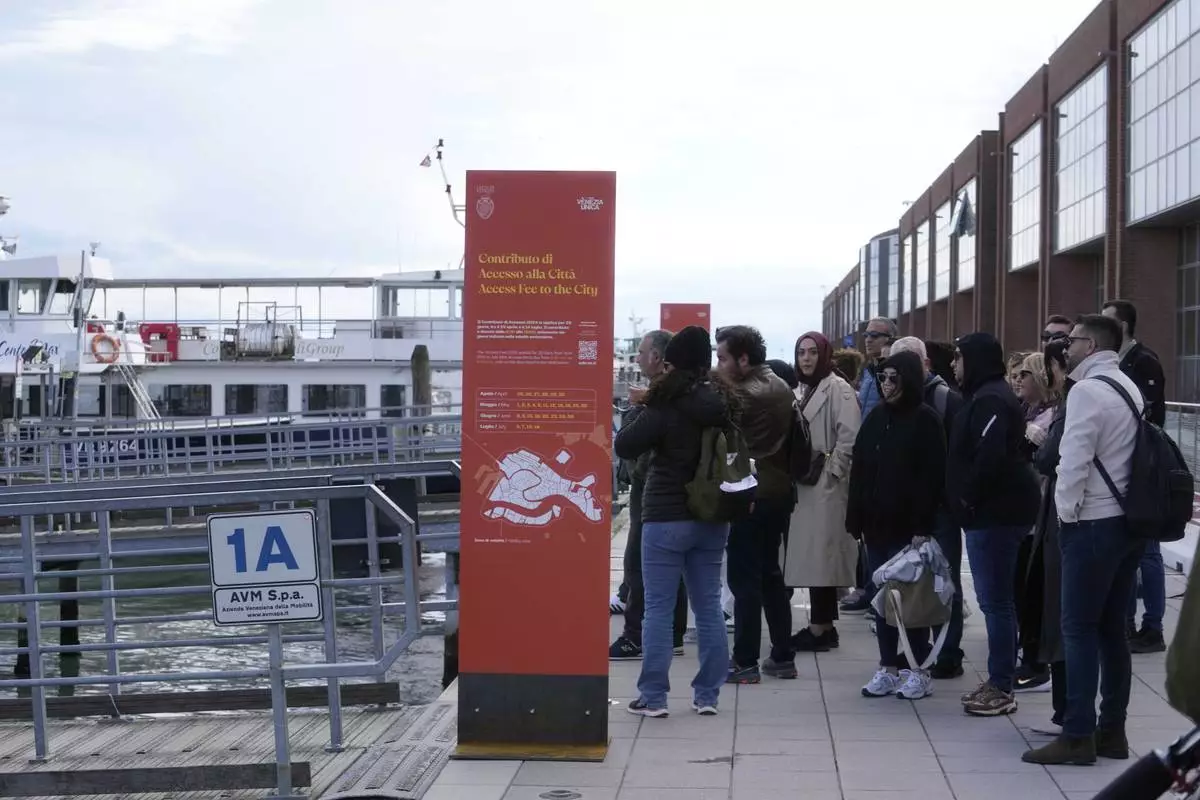
People stand in front of an information board explaining how to pay the tourist tax in Venice, Italy, Wednesday, April 24, 2024. The lagoon city of Venice begins a pilot program Thursday, April 25, 2024 to charge daytrippers a 5 euro entry fee that authorities hope will discourage tourists from arriving on peak days. Officials expect some 10,000 people will pay the fee to access the city on the first day, downloading a QR code to prove their payment. (AP Photo/Luca Bruno)
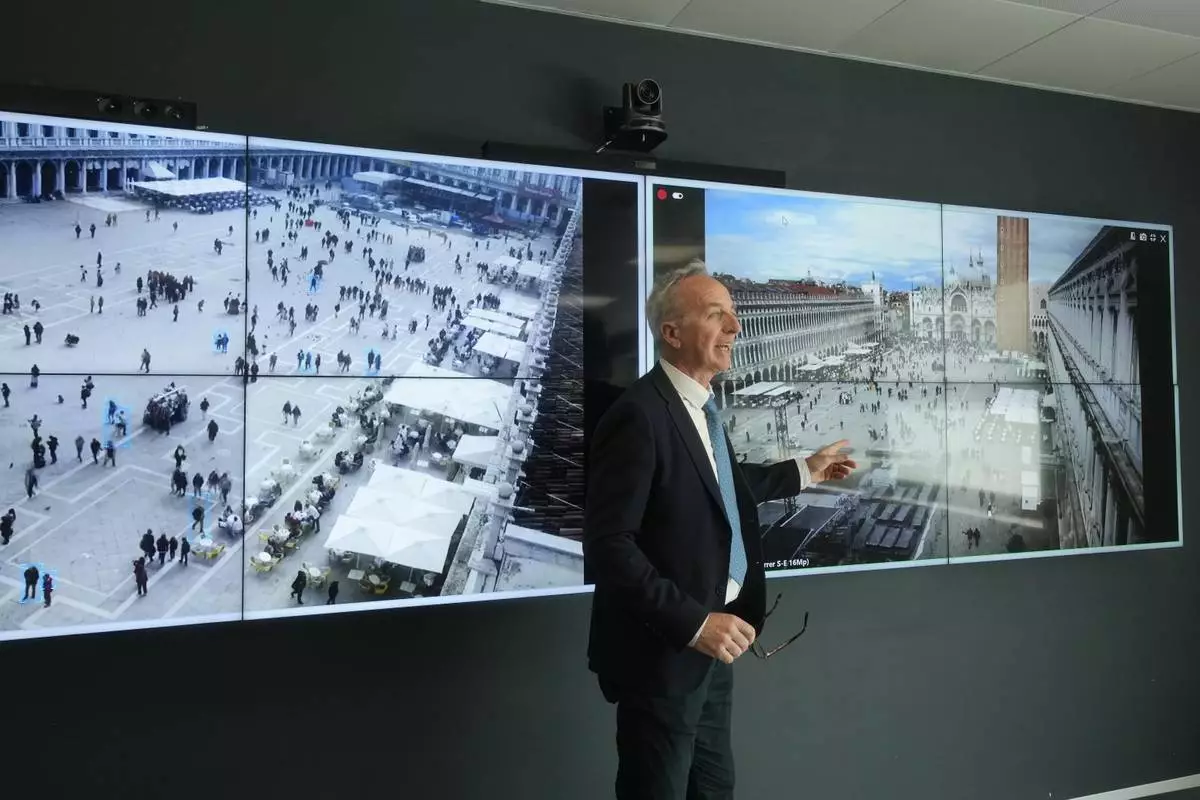
Marco Bettini, director of Venis Informatics System, gestures as he talks to reporters at the police Venice control room, in Venice, Italy, Wednesday, April 24, 2024. The lagoon city of Venice begins a pilot program Thursday, April 25, 2024 to charge daytrippers a 5 euro entry fee that authorities hope will discourage tourists from arriving on peak days. Officials expect some 10,000 people will pay the fee to access the city on the first day, downloading a QR code to prove their payment. (AP Photo/Luca Bruno)
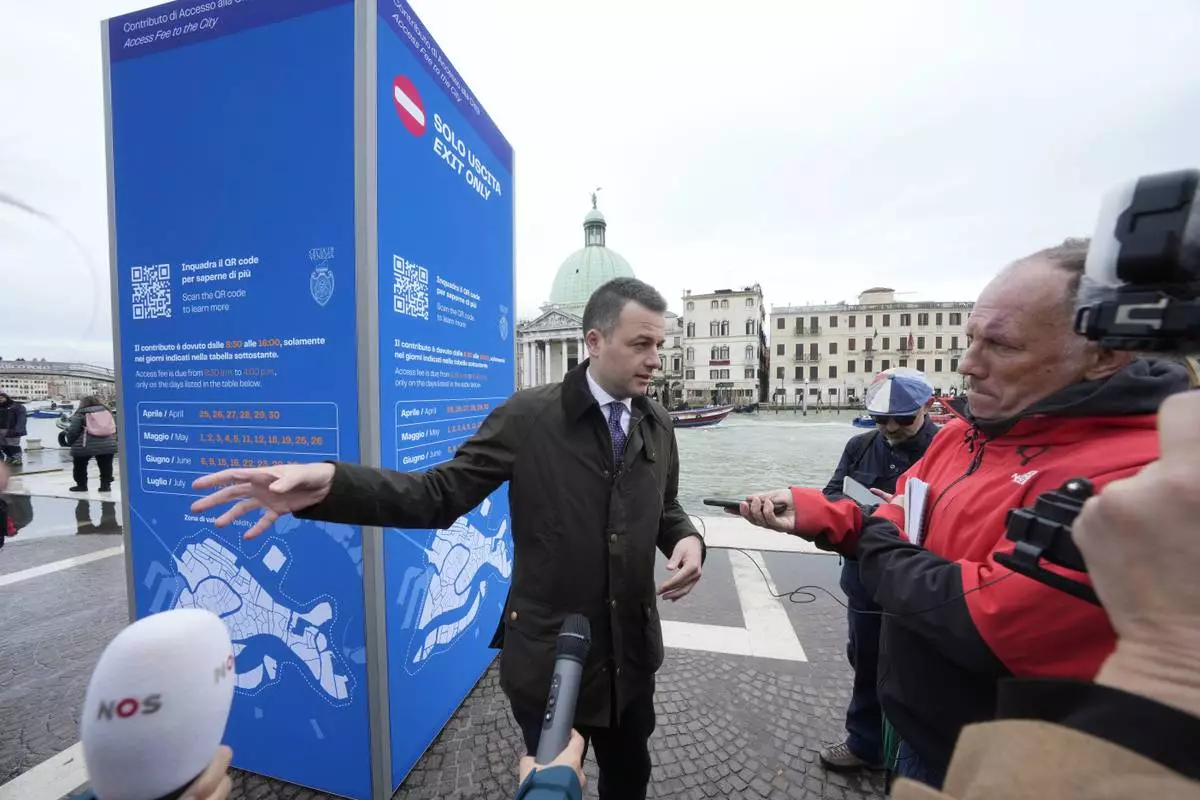
Venice councillor Simone Venturini speaks with reporters in front of a tourist tax totem in Venice, Italy, Wednesday, April 24, 2024. The lagoon city of Venice begins a pilot program Thursday, April 25, 2024 to charge daytrippers a 5 euro entry fee that authorities hope will discourage tourists from arriving on peak days. Officials expect some 10,000 people will pay the fee to access the city on the first day, downloading a QR code to prove their payment. (AP Photo/Luca Bruno)
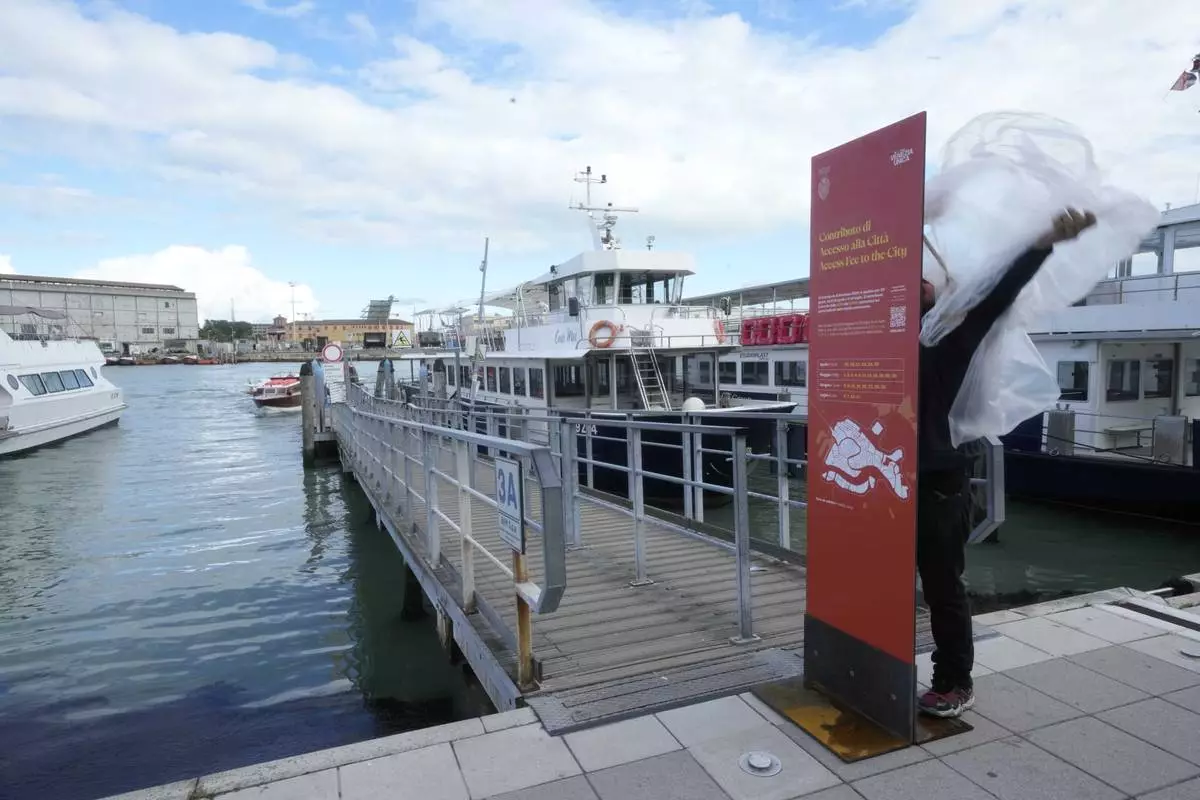
Workers prepare banner explaining how to pay the tourist tax in Venice, Italy, Wednesday, April 24, 2024. The lagoon city of Venice begins a pilot program Thursday, April 25, 2024 to charge daytrippers a 5 euro entry fee that authorities hope will discourage tourists from arriving on peak days. Officials expect some 10,000 people will pay the fee to access the city on the first day, downloading a QR code to prove their payment. (AP Photo/Luca Bruno)
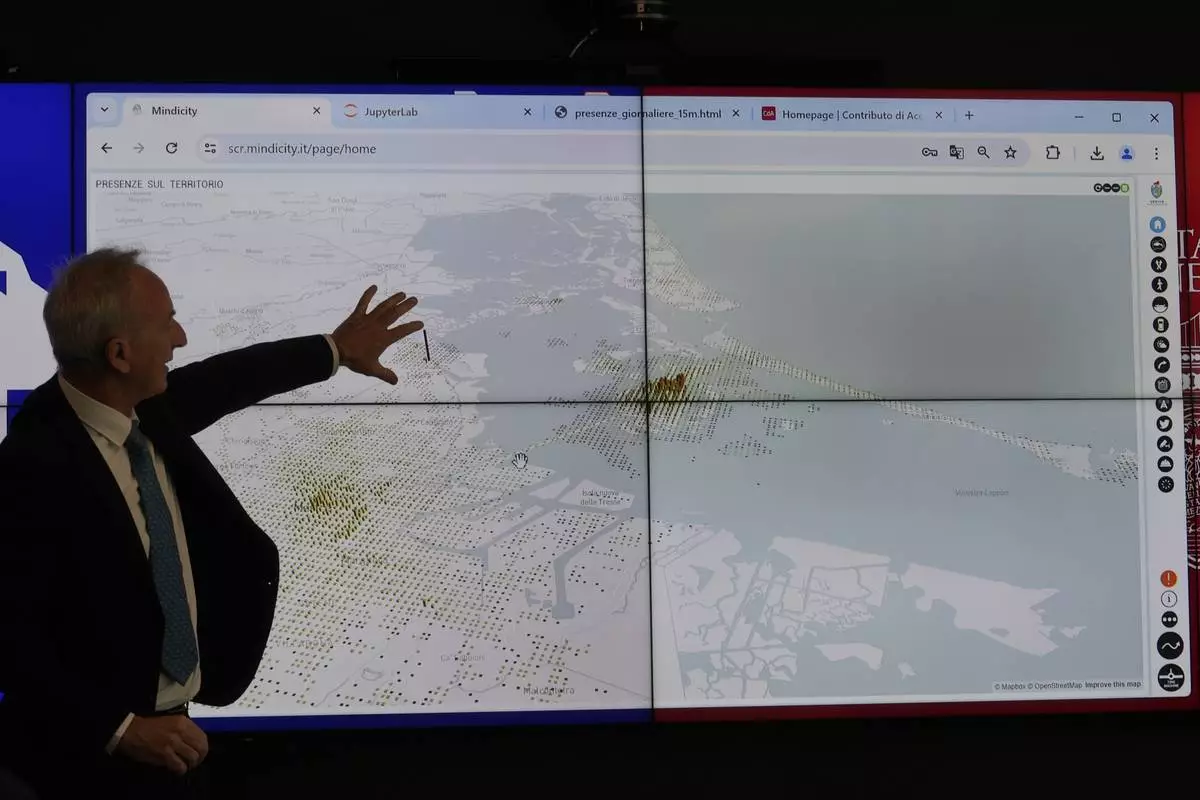
Marco Bettini, director of Venis Informatics System, gestures as he explains the Venice density to reporters at the police Venice control room in Venice, Italy, Wednesday, April 24, 2024. The lagoon city of Venice begins a pilot program Thursday, April 25, 2024 to charge daytrippers a 5 euro entry fee that authorities hope will discourage tourists from arriving on peak days. Officials expect some 10,000 people will pay the fee to access the city on the first day, downloading a QR code to prove their payment. (AP Photo/Luca Bruno)
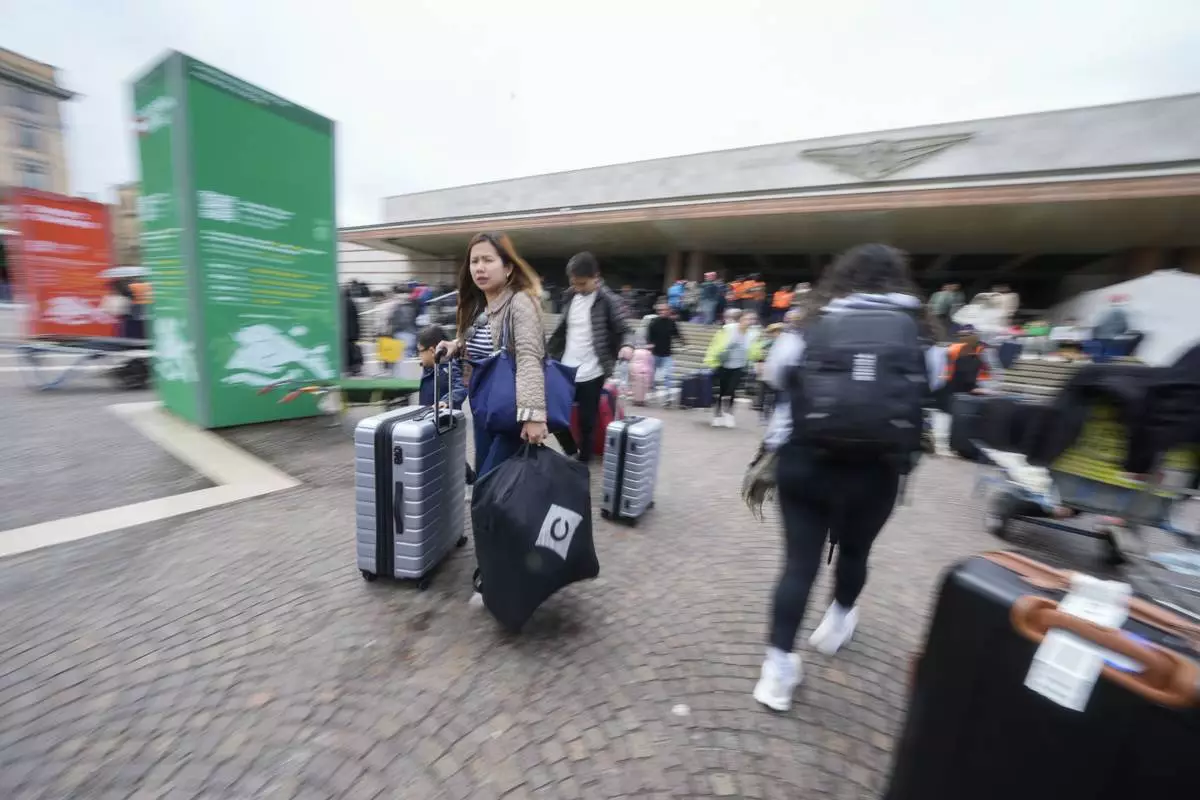
Tourists arrive at the main train station in Venice, Italy, Wednesday, April 24, 2024. The lagoon city of Venice begins a pilot program Thursday, April 25, 2024 to charge daytrippers a 5 euro entry fee that authorities hope will discourage tourists from arriving on peak days. Officials expect some 10,000 people will pay the fee to access the city on the first day, downloading a QR code to prove their payment. (AP Photo/Luca Bruno)
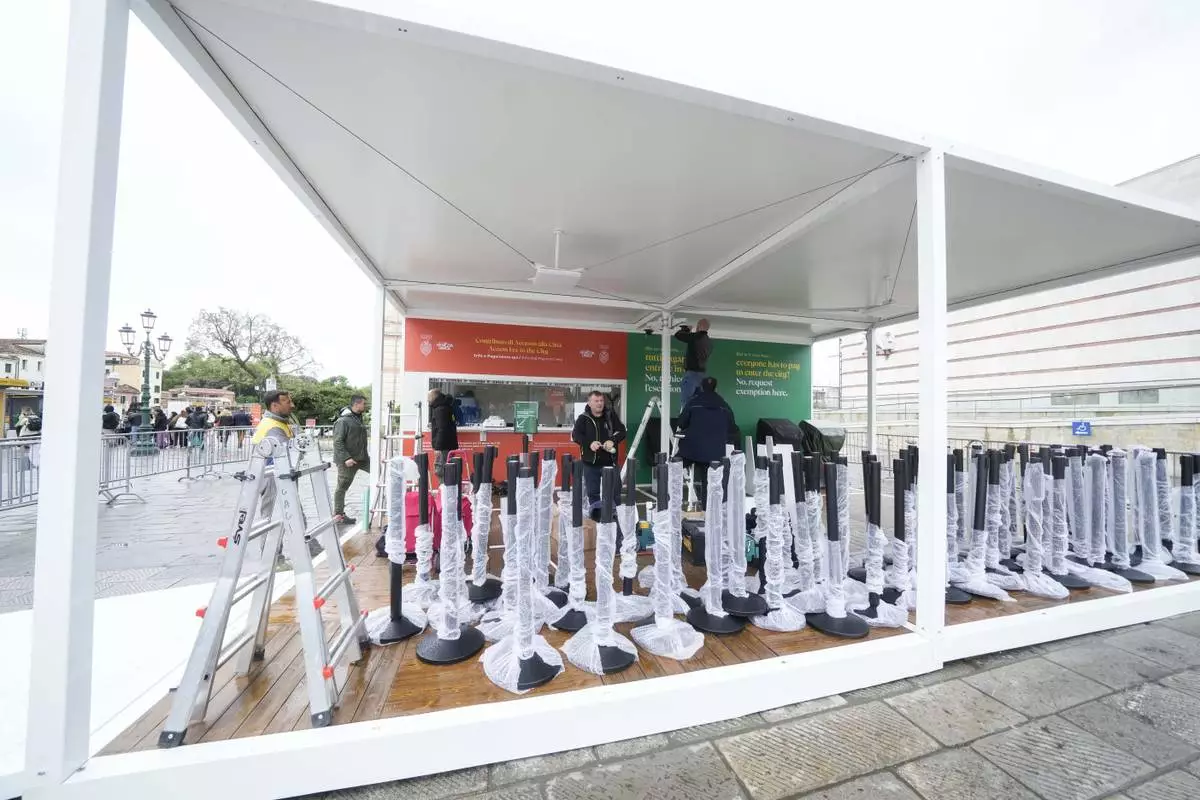
Workers prepare the tourist tax cashier desks outside the main train station in Venice, Italy, Wednesday, April 24, 2024. The lagoon city of Venice begins a pilot program Thursday, April 25, 2024 to charge daytrippers a 5 euro entry fee that authorities hope will discourage tourists from arriving on peak days. Officials expect some 10,000 people will pay the fee to access the city on the first day, downloading a QR code to prove their payment. (AP Photo/Luca Bruno)
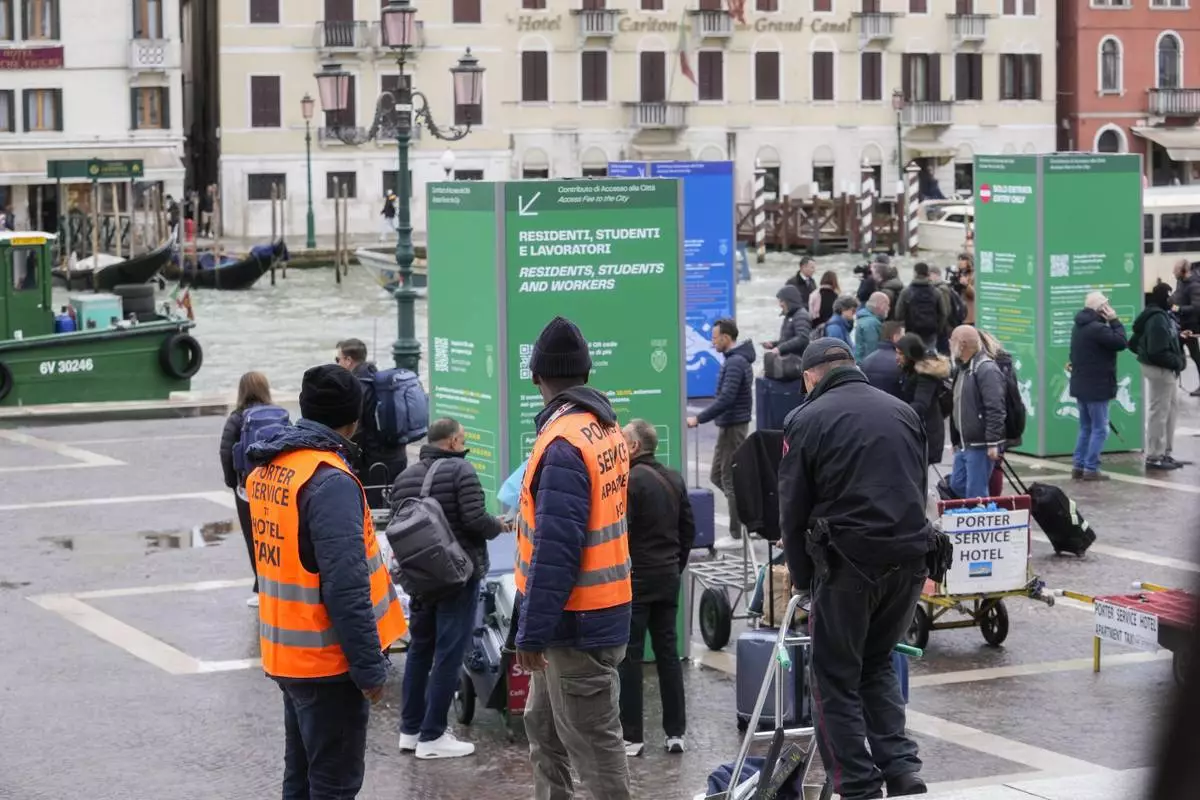
Porters wait for tourists outside the main train station in Venice, Italy, Wednesday, April 24, 2024. The lagoon city of Venice begins a pilot program Thursday, April 25, 2024 to charge daytrippers a 5 euro entry fee that authorities hope will discourage tourists from arriving on peak days. Officials expect some 10,000 people will pay the fee to access the city on the first day, downloading a QR code to prove their payment. (AP Photo/Luca Bruno)
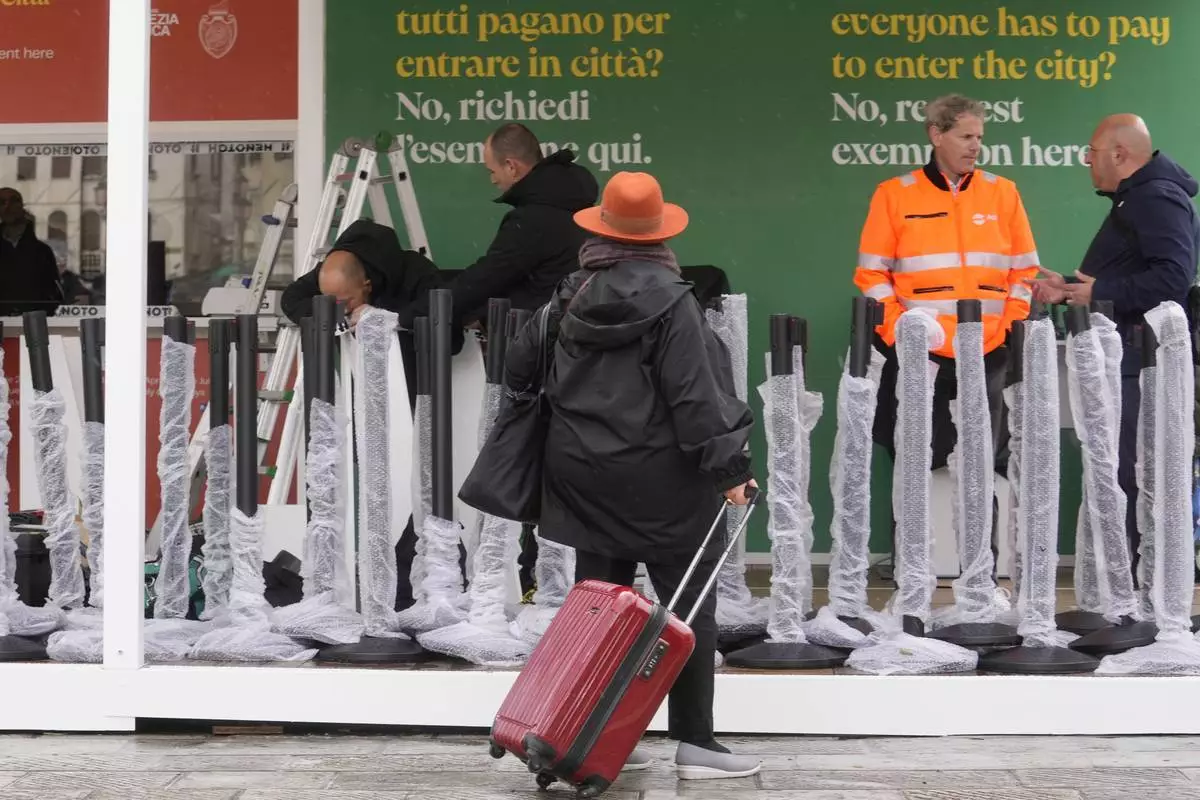
Workers prepare the tourist tax cashier desks outside the main train station in Venice, Italy, Wednesday, April 24, 2024. The lagoon city of Venice begins a pilot program Thursday, April 25, 2024 to charge daytrippers a 5 euro entry fee that authorities hope will discourage tourists from arriving on peak days. Officials expect some 10,000 people will pay the fee to access the city on the first day, downloading a QR code to prove their payment. (AP Photo/Luca Bruno)
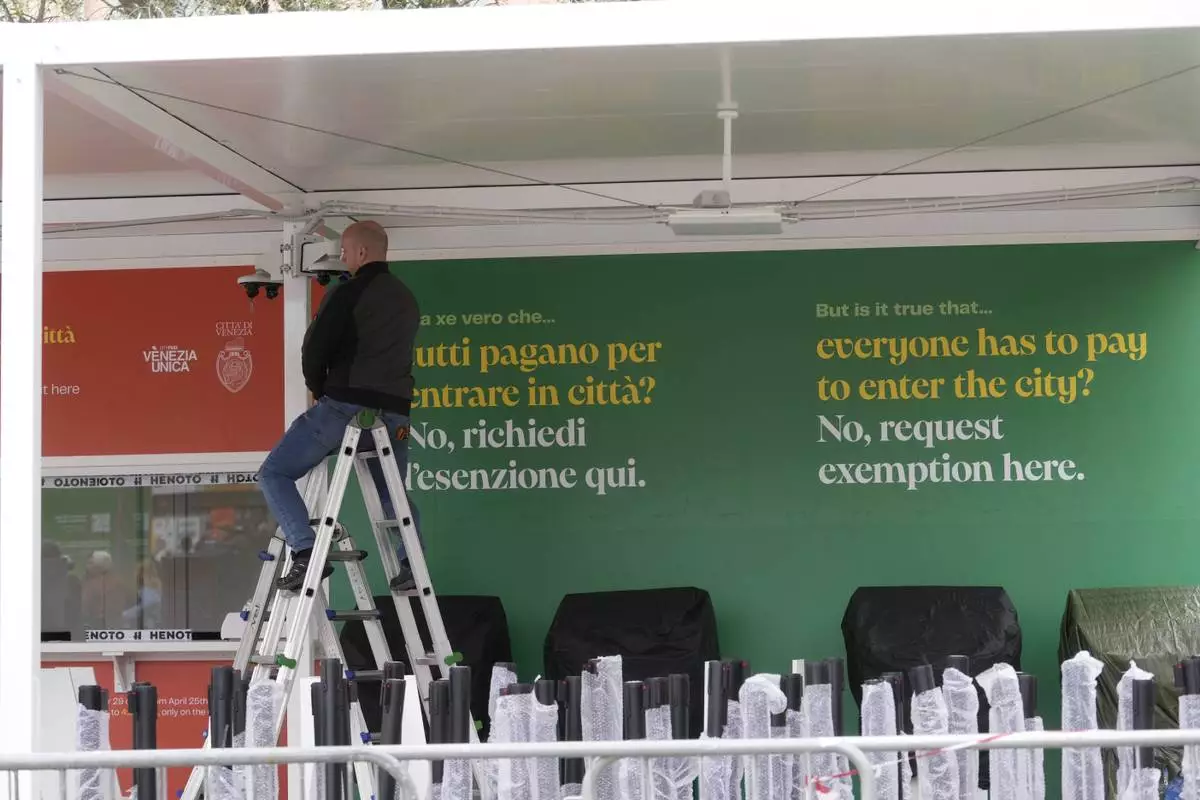
Workers prepare the tourist tax cashier desks outside the main train station in Venice, Italy, Wednesday, April 24, 2024. The lagoon city of Venice begins a pilot program Thursday, April 25, 2024 to charge daytrippers a 5 euro entry fee that authorities hope will discourage tourists from arriving on peak days. Officials expect some 10,000 people will pay the fee to access the city on the first day, downloading a QR code to prove their payment. (AP Photo/Luca Bruno)
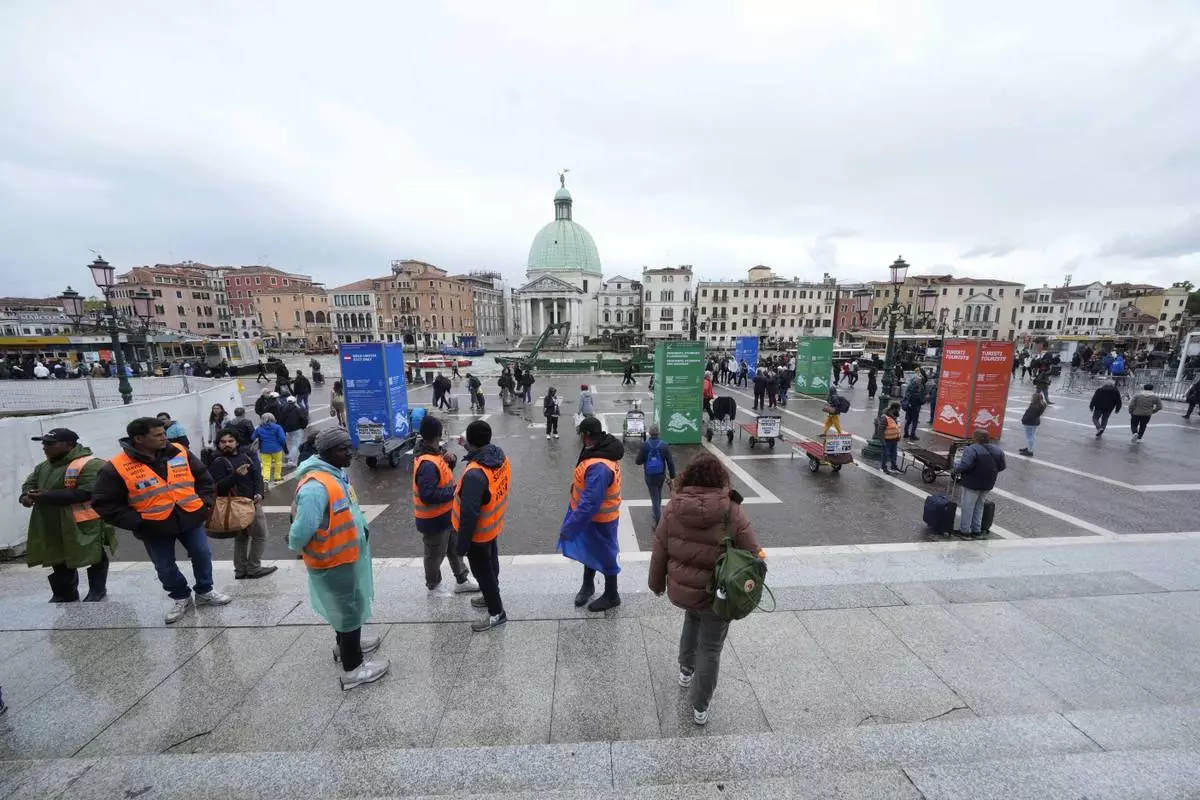
Porters wait for tourists outside the main train station in Venice, Italy, Wednesday, April 24, 2024. The lagoon city of Venice begins a pilot program Thursday, April 25, 2024 to charge daytrippers a 5 euro entry fee that authorities hope will discourage tourists from arriving on peak days. Officials expect some 10,000 people will pay the fee to access the city on the first day, downloading a QR code to prove their payment. (AP Photo/Luca Bruno)
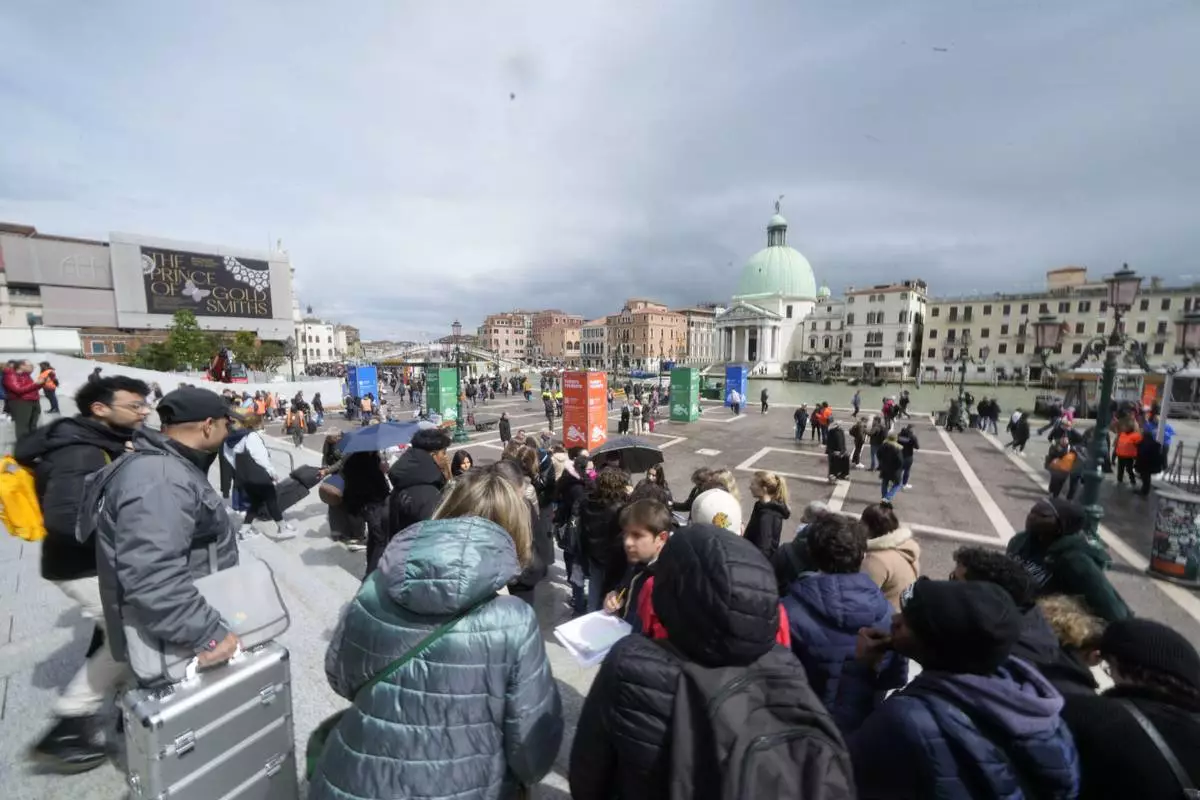
Tourists arrive outside the main train station in Venice, Italy, Wednesday, April 24, 2024. The lagoon city of Venice begins a pilot program Thursday, April 25, 2024 to charge daytrippers a 5 euro entry fee that authorities hope will discourage tourists from arriving on peak days. Officials expect some 10,000 people will pay the fee to access the city on the first day, downloading a QR code to prove their payment. (AP Photo/Luca Bruno)
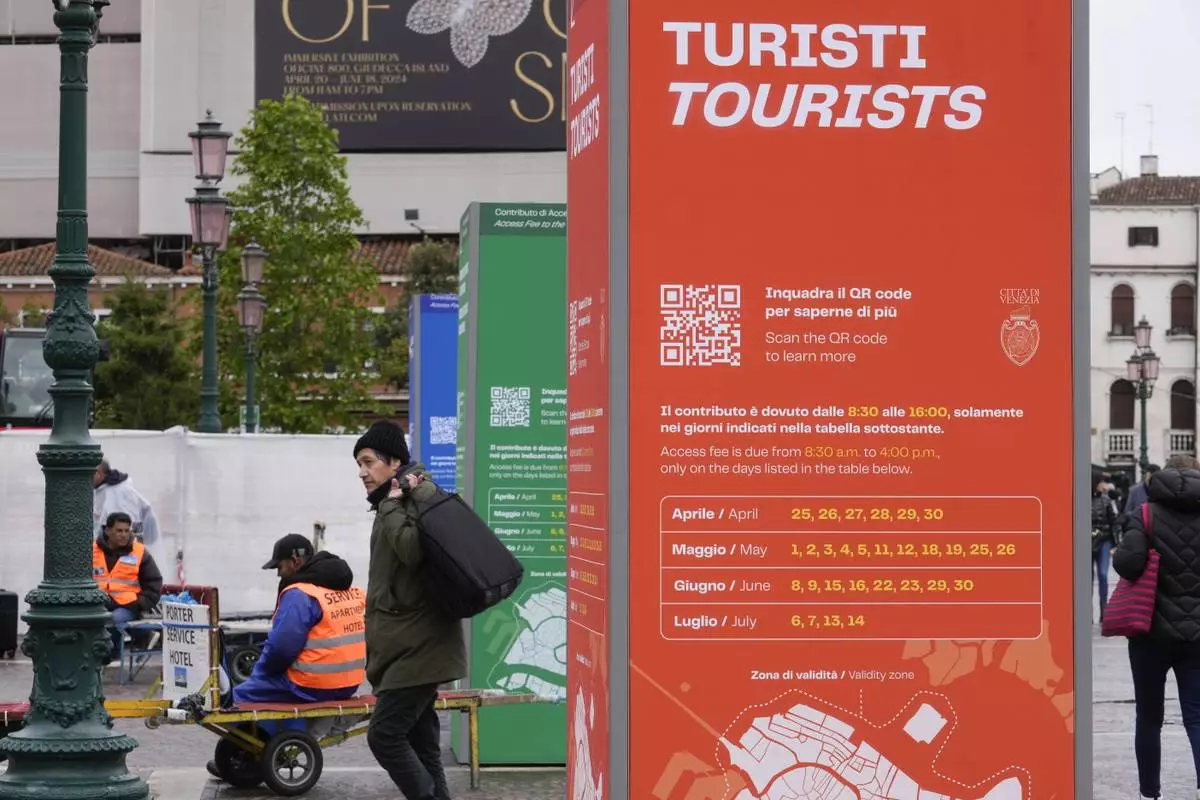
Tourist information boards are seen outside the main train station in Venice, Italy, Wednesday, April 24, 2024. The lagoon city of Venice begins a pilot program Thursday, April 25, 2024 to charge daytrippers a 5 euro entry fee that authorities hope will discourage tourists from arriving on peak days. Officials expect some 10,000 people will pay the fee to access the city on the first day, downloading a QR code to prove their payment. (AP Photo/Luca Bruno)
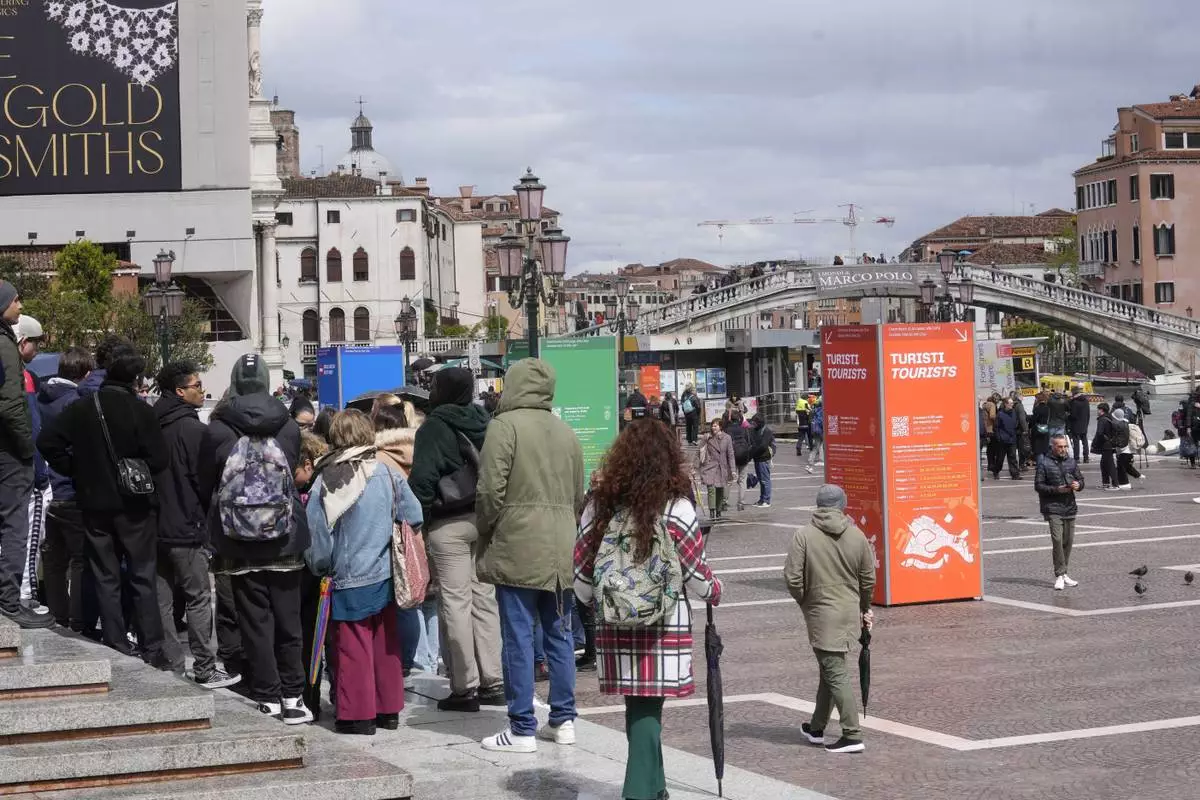
Tourists arrive outside the main train station in Venice, Italy, Wednesday, April 24, 2024. The lagoon city of Venice begins a pilot program Thursday, April 25, 2024 to charge daytrippers a 5 euro entry fee that authorities hope will discourage tourists from arriving on peak days. Officials expect some 10,000 people will pay the fee to access the city on the first day, downloading a QR code to prove their payment. (AP Photo/Luca Bruno)





































